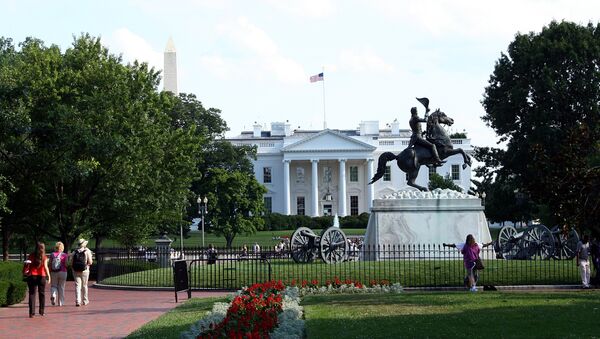Sputnik discussed the economic repercussions of US sanctions on Russia with Daniel Lacalle, chief economist at Tressis Gestion and author of the book 'Escape from the Central Bank Trap'.
Sputnik: In your view how do economic sanctions imposed by the US government affect private business partnerships between Russia and the United States? The question is, are there any private business partnerships left between Russia and the United States?
Daniel Lacalle: Yes, probably very little, I agree with you. I think the problem of imposing sanctions is that what ends up happening is that what you achieve, even if the United States had a certain reason for it, is the opposite. What sanctions will end up doing to most economies is to make the economies more vulnerable and (lessen) the possibility (for) partnerships between companies, the development of joint skills, or the improvement of relationships between the countries. So the challenge of sanctions and the debate about sanctions has been ongoing for many, many years all over the world, and I think if there is any evidence it is that imposing them does not accelerate the improvement of relations.
READ MORE: US Establishment Push Sanctions to Derail Paul's Mission to Russia — Ex-Diplomat
Sputnik: How do they affect economic growth both in Russia and the US? From our perspective here in Russia, and speaking to experts and political commentators, we're scratching our heads, because, since sanctions since sanctions were initiated back in 2014, there's been so much internal investment into the Russian economy, whether it's the agricultural sector, fisheries, pharmaceuticals or the automotive industry. It's obviously had its effect, but there's been the rebound effect as well, and it's also creating a new geopolitical world order in terms of globalization: there's not just one globalization, there's like three or four globalizations going on. So in many ways, it is having an adverse effect, surely…
Daniel Lacalle: Definitely, in many cases what happens is that you have to have a very precise view about what those sanctions aim to achieve. Maybe there is a ground to decide what the effect is. Is it going to be to achieve more transparency, they people achieve through bilateral agreements, more cooperation, etc.? Is it to achieve economic stagnation, obviously, that is not working because the economies are growing robustly and there's a very strong level of investment from all over the world from other countries, so sometimes the sanctions end up being the opposite, or achieving the opposite of what they aim to achieve and that is something that needs to be pondered by all countries.
READ MORE: Russian PM Compares Further Anti-Moscow Sanctions to Economic Warfare
Now I think that in the case of globalization, this particular case of globalization, it is evident that the role of Russia in the energy world, in the agricultural export world, in the industrial world, is now diminishing. Therefore, a lot more could be achieved by having an intense, open, very frank dialogue and bilateral agreements that would achieve a much better result for everybody, and I think that cooperation with an economy, Russian economy, that is an integral part of the resource industry is absolutely critical.
Daniel Lacalle: I think that what the US administration is looking for is to force Russia and many of the industries to become more open, and become more open in the way which obviously the United States views as a concept of openness, there are large industries in Russia that are state-owned or very close to the government that are perceived as sort of a unity, but you don't achieve it through sanctions. You don't achieve that through sanctions even if you have a case, and I think that the openness of the Russian economy is very, very evident.
READ MORE: Analysts on How US Anti-Russian Sanctions May Affect Ruble, Foreign Investors
I remember the first time I went to Moscow 25 years ago and what it is today, what Russia is today in terms of investment, in terms of independent companies that have flourished completely outside of the scope of government protection or intervention. So there are many things that the government should acknowledge as positives, more importantly, the evidence of the result of the sanctions so far is that it is not achieving the kind of results that the present administration, or the Obama administration looked for. I think there needs to be rethinking there of the role of the sanctions, and I think that is what all nations want is more cooperation, more transparency, better goods and services, a better environment for everybody and peaceful cooperation, and I think there are better ways of achieving that.
The views and opinions expressed by Daniel Lacalle are those of the speaker and do not necessarily reflect those of Sputnik.





